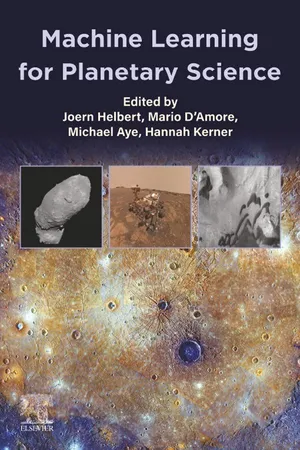
eBook - ePub
Machine Learning for Planetary Science
- 232 pages
- English
- ePUB (mobile friendly)
- Available on iOS & Android
eBook - ePub
Machine Learning for Planetary Science
About this book
Machine Learning for Planetary Science presents planetary scientists with a way to introduce machine learning into the research workflow as increasingly large nonlinear datasets are acquired from planetary exploration missions. The book explores research that leverages machine learning methods to enhance our scientific understanding of planetary data and serves as a guide for selecting the right methods and tools for solving a variety of everyday problems in planetary science using machine learning. Illustrating ways to employ machine learning in practice with case studies, the book is clearly organized into four parts to provide thorough context and easy navigation.
The book covers a range of issues, from data analysis on the ground to data analysis onboard a spacecraft, and from prioritization of novel or interesting observations to enhanced missions planning. This book is therefore a key resource for planetary scientists working in data analysis, missions planning, and scientific observation.
- Includes links to a code repository for sharing codes and examples, some of which include executable Jupyter notebook files that can serve as tutorials
- Presents methods applicable to everyday problems faced by planetary scientists and sufficient for analyzing large datasets
- Serves as a guide for selecting the right method and tools for applying machine learning to particular analysis problems
- Utilizes case studies to illustrate how machine learning methods can be employed in practice
Tools to learn more effectively

Saving Books

Keyword Search

Annotating Text

Listen to it instead
Information
Table of contents
- Title of Book
- Cover image
- Title page
- Table of Contents
- Copyright
- Contributors
- Foreword
- Chapter 1 Introduction to machine learning
- Chapter 2 The new and unique challenges of planetary missions
- Chapter 3 Finding and reading planetary data
- Chapter 4 Introduction to the Python Hyperspectral Analysis Tool (PyHAT)
- Chapter 5 Tutorial: how to access, process, and label PDS image data for machine learning
- Chapter 6 Planetary image inpainting by learning mode-specific regression models
- Chapter 7 Automated surface mapping via unsupervised learning and classification of Mercury Visible–Near-Infrared reflectance spectra
- Chapter 8 Mapping storms on Saturn
- Chapter 9 Machine learning for planetary rovers
- Chapter 10 Combining machine-learned regression models with Bayesian inference to interpret remote sensing data
- Index
Frequently asked questions
Yes, you can cancel anytime from the Subscription tab in your account settings on the Perlego website. Your subscription will stay active until the end of your current billing period. Learn how to cancel your subscription
No, books cannot be downloaded as external files, such as PDFs, for use outside of Perlego. However, you can download books within the Perlego app for offline reading on mobile or tablet. Learn how to download books offline
Perlego offers two plans: Essential and Complete
- Essential is ideal for learners and professionals who enjoy exploring a wide range of subjects. Access the Essential Library with 800,000+ trusted titles and best-sellers across business, personal growth, and the humanities. Includes unlimited reading time and Standard Read Aloud voice.
- Complete: Perfect for advanced learners and researchers needing full, unrestricted access. Unlock 1.4M+ books across hundreds of subjects, including academic and specialized titles. The Complete Plan also includes advanced features like Premium Read Aloud and Research Assistant.
We are an online textbook subscription service, where you can get access to an entire online library for less than the price of a single book per month. With over 1 million books across 990+ topics, we’ve got you covered! Learn about our mission
Look out for the read-aloud symbol on your next book to see if you can listen to it. The read-aloud tool reads text aloud for you, highlighting the text as it is being read. You can pause it, speed it up and slow it down. Learn more about Read Aloud
Yes! You can use the Perlego app on both iOS and Android devices to read anytime, anywhere — even offline. Perfect for commutes or when you’re on the go.
Please note we cannot support devices running on iOS 13 and Android 7 or earlier. Learn more about using the app
Please note we cannot support devices running on iOS 13 and Android 7 or earlier. Learn more about using the app
Yes, you can access Machine Learning for Planetary Science by Joern Helbert,Mario D'Amore,Michael Aye,Hannah Kerner in PDF and/or ePUB format, as well as other popular books in Physical Sciences & Data Processing. We have over one million books available in our catalogue for you to explore.